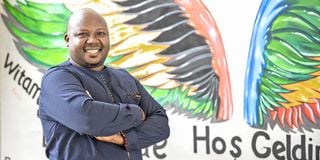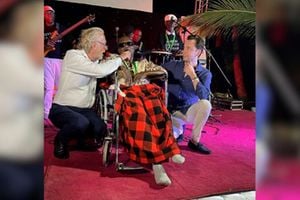
Principal Benson Majiwa with the mural of the Pharo School Homosha, Ethiopia in the background.
When we set out on a trip to the town of Homosha, in the north western part of Ethiopia, we would not have imagined that there was any chance of meeting a Kenyan in such a remote area, more than 600 kilometers from Addis Ababa.
The one-hour flight from the capital lands in Assosa, the regional headquarters of the state of Benishangul-Gumuz, before embarking on a 30-kilometer drive through a fairly decent highway, with the occasional crater-like pothole, to Homosha.
As you drive along the heavily forested terrain, there is little indication of the existence of a state-of the-art educational facility. Almost out of nowhere, an imposing gate announces the entrance to the Pharo School Homosha, a modern fully-fledged campus with boarding facilities for more than 200 girls sitting on 16 hectares.
It is sunset when we pull into the large compound which appears unusually dark.
“Is there an electricity outage?” we enquire. “No, here we rely on generator power because there is no supply from the grid,” says a gentleman who warmly receives us.
“The generator is just about to be switched on for the evening’s activities.”
There is something about his accent that sounds distinctly familiar.
“Karibu Homosha,” he says.
Benson Majiwa, a Kenyan teacher, is the principal of the Pharo School Homosha.
Mr Majiwa has been teaching the Ethiopian curriculum for four years now, and has been the head of the school for two years now. A graduate of Moi University (Languages) and Egerton University (Education), he started his career as a teacher in Kenya, teaching the Kenyan public school system. He then spent 12 years teaching the British curriculum, including an eight-year stint at Nairobi Jaffrey Academy.
While studying for his Master’s, his academic project on psychology was based on research at the Juvenile Remand Home in Lower Kabete.
“I found many young people who had become delinquents because they lacked someone to help them navigate life during their teenage years. That was a turning point in my life as an educationist.”
How did he end up in this remote part of Ethiopia?
During the Covid-19 pandemic, he was working at the Kinderworld International School as it transitioned from the Kenyan system to the British curriculum. During that time, he met Akif Naqvi, a British School Overseas Inspector, who would later become the Principal of the Pharo School in Homosha. Naqvi, an internationally experienced headteacher, was impressed with Mr Majiwa’s skills and headhunted him to deputise as school head at the new school in Ethiopia.
“My father was a forest officer and I grew up moving from one forest station to another, I am used to living in remote areas so this opportunity to move to a remote part of a foreign country did not faze me,” says Mr Majiwa.

Mr Majiwa with the Ethiopian classical pianist Girma Yifrashewa during the handover of a new upright piano to the school.
“I was also inspired by what the Pharo Foundation was doing, transforming the lives of the young girls and the community surrounding the school.”
Pharo Foundation is a privately funded organisation with headquarters in London that runs programmes in education, health, water and agriculture in Ethiopia, Somaliland, Rwanda and Kenya. Before the school in Homosha opened in February 2020, the enrolment rate for girls in the region was as low as 32 percent for those from certain communities in the region.
Mr Majiwa moved to Homosha as Deputy Head of School in August 2021, and two years later, he succeeded Naqvi as Principal. He discovered that boarding school is a relatively new concept in Ethiopia, unlike in Kenya where the model has historically been an essential part of the education system.
“There were no routines. No night preps, lessons would go on till 5pm in a region where temperatures hit 40 degrees. There was no proper dress code and the students used tiny exercise books that would fill up in a week,” he says.
He had to establish a system that would enable the students to operate within a set of rules while allowing them to also have sufficient time for co-curricular activities. In September 2024, the school received an upright piano from Pharo Foundation in the UK, and according to the principal, the performing arts aligns with the new curriculum in Ethiopia, which just like the CBC in Kenya, is founded on practical skills.
“Many of the girls can sing, and so the piano is a welcome addition that will enable them enhance their talents,” he says.
The school admits girls in Grade 9, to undertake four years of secondary education. At the moment there are 133 students and last Saturday they conducted interviews for a fresh cohort of Grade 9 with a target to hit 200 students.
Admission is based on a scholarship model, where students sit for an entrance examination to test their aptitude and academic level. For the first three years of operation, the school provided the students with all the essentials: books, uniforms, meals and sanitary pads, but parents are now required to contribute part of the children’s upkeep. However, the majority of the girls are children of peasant farmers drawn from the rural community in Homosha and require absolute support.
“The students are very committed, and teachers spend less time on supervision because the girls know what is required of them,” says Mr Majiwa.
During his first year in charge, the school attained a 100 percent pass mark in the Grade 12 national examinations and his colleagues have taken to jokingly referring to him as the “100 percent principal.”
That success was achieved despite the tremendous odds facing the institution, not least the lack of power supply which means the school is reliant on generator for 13 hours in a day.
The generator is switched on at 5.45am so that students can prepare for breakfast. It is then turned off at 12pm during lunch break and switched back on at 1pm when afternoon classes begin and go on until 5pm (classes end at 3pm). It is then turned back on at 6.45pm and switched off at 10.30pm until the next morning. Ironically the Grand Ethiopian Renaissance Dam, which has reportedly doubled Ethiopia’s electricity production, is located in the Benishangul Gamuz region.
The region is also surrounded by conflict areas such as Amhara, Gambela and Oromia, where the Oromo Liberation Army is engaged in a long-running conflict with the federal government. It also borders the Republic of Sudan to the north.
“I know in Kenya schools only need a few askaris, but here security is a huge issue and the head of security is actually a former police officer,” says Mr Majiwa.
He manages a team of 19 teachers and 58 support staff, of which 19 are security personnel.
He has learnt the Ethiopian way of life, which means being philosophical about every situation.
“They are a very hospitable people who always greet you with a smile. On the flip side, I have learnt to be very patient because people do things at their own pace. I have made my team know that there are tasks that must meet a deadline, but there are other duties which I ask them to tell me when they are comfortable completing,” he explains.
Last year, another Kenyan, Salome Maina, a teacher of English, joined the staff at the Pharo School Homosha. “Finding Mr Majiwa here was very reassuring for me and helped me settle down a lot faster,” says Ms Maina.

Salome Maina, a Kenyan who teaches English at the Pharo School, Homosha, Ethiopia.
Her previous job at a school at the Dadaab Refugee camp run by the humanitarian organisation, Windle International Kenya, prepared her for the experience of working in locations with extreme conditions. Last year she taught the Junior Secondary class, and this will be her first year with Grade 11 and the Grade 12 examination candidates.
“The students have a fairly good grasp of English, and whenever there are difficulties in understanding something, then I will identify the students who have understood and ask them to explain to the others in Amharic or the other local languages.”
The foreign teachers have also had to adopt to the Ethiopian school calender that begins in September and ends in July.
“When we are here, we use the Ethiopian calendar, which consists of 13 months, so we just celebrated our New Year 2017 on September 11,” says Mr Majiwa with a smile.
“I also celebrate Christmas Day twice, on December 25 and January 7 with the Ethiopian Orthodox Church”. These Kenyan teachers are motivated by the experience of making a difference to the futures of young girls in a far-flung region of Ethiopia, whose lives might have turned out very differently if they didn’t get a chance at education.




